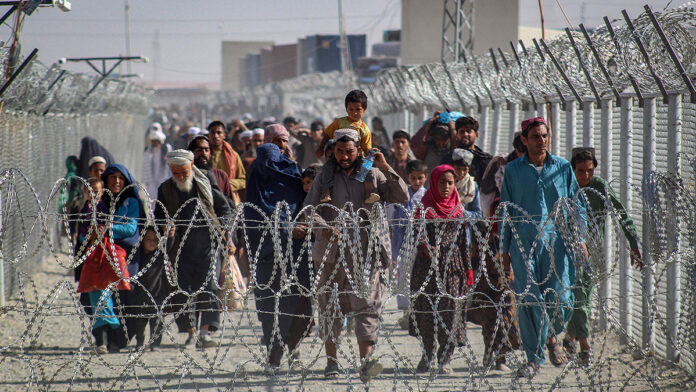Pakistan’s hasty deportation of Afghan refugees may be a strategic blunder, jeopardising its economy and regional stability.
Procrastination at a national level is not just an individual bad habit; it becomes a systemic weakness that stifles progress, weakens institutions, and leaves a nation vulnerable to internal and external threats. Combating it requires strong, nationally committed leadership, cultural shifts, and better resource-time management policies. Such policies automatically ensure timely action in both the public and private sectors.
Unfortunately, Pakistan presents the opposite, with the latest case in point being the decision to send all Afghans back to their country.
Lack of a long-term strategy and an absent legal framework, despite the compulsion of dealing with the consequences of two Afghan wars, has turned Afghan refugees and all those settled here for decades, from a potential economic asset and goodwill ambassadors, into frustrated, helpless, and annoyed individuals being forced to leave Pakistan.
Following a brazen cross-border TTP attack on villages near Chitral in early September 2023, Pakistan began implementing the Illegal Foreigners’ Repatriation Plan (IFRP) in late 2023, resulting in the deportation of Afghan nationals holding Proof of Registration (PoR) cards as well as other undocumented migrants. By the end of June, even officially registered Afghan refugees are supposed to leave Pakistan.
UNHCR says as many as 2.8 million Afghans still live in Pakistan, and with the implementation of the IFRP by June, nearly 1.4 million Afghans—undocumented refugees, and those in refugee-like situations—are returning to Afghanistan. According to the report, the majority of those expelled were undocumented, including those who held Afghan Citizenship Cards and Proof of Registration cards (PoR). Pakistani officials spoke of about 800,000 undocumented Afghans who had been living in Pakistan for years, particularly since the return of the Taliban to power in August 2021.
Documentation and deportation of those staying illegally is a necessary act and in sync with national and international laws. All countries practice it. Yet, painting all Afghan residents in Pakistan with the same brush seems both illogical, unfortunate, and unfair- even to our national economic interests. Particularly, asking all those Afghans who are well-anchored into the social and economic life, such as traders, businessmen, and educationists reflects badly on the state of Pakistan.
Ironically, many of those affected are part of generations of Afghans who were born, raised, and educated in Pakistan. Most of them have never known any life outside Pakistan and have little or no connection whatsoever with Afghanistan. This deportation policy is generating profound negative vibes with direct impact on the economic stability, physical and mental health, and social standing of those under the radar.
Afghans born in Pakistan are technically eligible for citizenship under Section 4 of the Pakistan Citizenship Act, 1951, if their parents are legally settled through marriage, adoption, or naturalization. The law also allows foreigners to apply for citizenship through naturalization after residing legally in Pakistan for at least seven years. However, many Afghans with strong social and economic ties still face a slow, opaque process. Despite these legal avenues, systemic barriers, political delays, and social sensitivities often render them ineffective in practice.
A large portion of the Afghan population in Pakistan, more than 60% of the 1.4 million registered refugees, has lived here for years, with little or no ties to Afghanistan. Many of these individuals run businesses, pay taxes, and fill labour gaps in various sectors like trade, construction, and services.). Often, they operate through partnerships with Pakistani friends or relatives (through marriages), or solely in the name of Pakistanis. Yet, they are at risk of being expelled from the only country they have ever known.
I know several Afghans who have developed big direct or indirect business interests in the country over three decades. None of them wants to leave Pakistan and would love to assume Pakistani citizenship.
Pakistan can learn from both Iran and Turkey for an expedient and mutually beneficial policy towards Afghan migrants. Despite their own challenges, both countries have managed to extract benefits from their Afghan populations. Pakistan’s knee-jerk expulsions only hurt its economy, global image, and regional stability.
Following the August 2021 changes in Kabul, Turkey prevented mass Afghan inflows but allowed some via humanitarian visas. More importantly, it welcomed and facilitated affluent Afghans to live, work, and do business with the tons of dollars they brought with them – a sort of facilitation of elite migration that contributed to the local economy. Istanbul owed its post-2021 real estate boom also to wealthy Afghans.
Iran, with the second-largest Afghan refugee population since the 1990s, issued the Amayesh Cards (Refugee IDs) that allowed them legal work, healthcare, and schooling. It has also been periodically expelled. The existing regulations permitted Afghans to pick up jobs in sectors such as farming, mining, and construction as cheaper labour. But they are obliged to pay for permits, healthcare, and schooling, generating state revenue.
Because of the turbulent and uncertain situation before August 2021, scores of big, affluent Afghan traders have been wanting to invest in Pakistan. But the absence of legal protection (no permanent residence, no bank account facility, no rights to buy property) deterred them from parking their dollars here—and they instead headed to Turkey or Dubai (Alokozay, Azizi Groups, for example).
Procrastination cost Pakistan potentially hundreds of millions of dollars, Afghan friends keep telling me. Pakistan remains the closest, safest, and most comfortable for most Afghan businessmen. Why not create a legally protected ease-of-doing-business environment for Afghan businesses, the way other countries do to attract investment?




